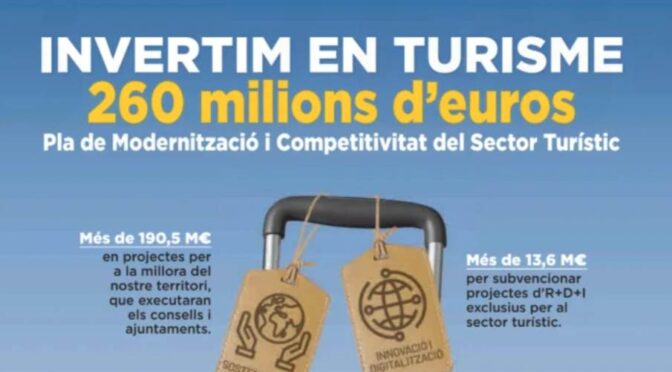Views: 207
We live in strange times. People rent lounge chairs on the beach to avoid touching the sand. But when the beach ends up looking like a hard surface without sand, as it has this year at Sant Tomàs, no one wants to rent chairs. Then, the City Council considers moving them to Binigaus, a pristine beach where there are still sandy areas, with the goal that people can rent the chairs and thus not touch the sand. That’s the way the world is.
The phenomenon of overtourism is erupting as a problem in our nearby world. It has been experienced for some time in areas like Venice or Everest, but the demonstrations that took place in the Canary Islands last April have also opened Pandora’s box in the Balearic Islands.
In recent weeks, there have been mobilizations on this issue in Ibiza, Mallorca, and also in Barcelona. But lo and behold, the demonstration that filled the Biosfera Square in Maó was interpreted by the governing team of the Insular Council as a protest with “political” purposes. This strategy of framing the news within a context of political intent presents two linked flaws.
In psychology, it is often explained that our thoughts flow in the brain quite automatically and sometimes do not fit with the moment and environment we find ourselves in. One of these distorted thoughts appears when we use a mechanism known as projection, which makes us imagine that people think and react as we would from our own perspective.
When a public official explains the demonstration as an operation orchestrated by opposing political groups, they display an analytical framework where politics is relegated to active participation in parties and where it is inconceivable that there could be political activism that is not previously mediated by these structures now in opposition.
And this is the second flaw that becomes evident: thinking that people can only take a stand based on what political parties say, and not the other way around. The order of the factors here is important, especially when it comes to a democratic exercise driven by civic associations. Many of the issues affecting society are highlighted by the citizens. Thinking it always has to be the other way around is viewing democracy in a very segmented way.
Those who analyze it this way – intentionally or not – forget that exercising politics directly from the people should not be a reason for institutional criticism – which exudes nostalgia for old times – but rather an object of applause.
They forget that, while Article 6 of the Constitution states that political parties are a fundamental instrument of political participation, Article 9 says that public authorities must facilitate people’s participation in political, economic, cultural, and social life.
This was the purpose of the fun and substantive gathering in the square, which turned for a day into Cala Biosfereta, where there was indeed a solution for renting chairs.
It was about analyzing and suggesting modifications to the economic model, defending cultural and territorial values, and giving voice to the indignation of a society that sees an increase in tourists and a decrease in positive results.
It was, therefore, about expressing opinions, proposing measures, and doing good politics. Directly. In an organized way and with a clear will for continuity.
This text is an adaptation from an automated translation of the original article published by Miquel Camps, as coordinator of territorial policy for the GOB, in the Menorca newspaper on 24/06/2024.

